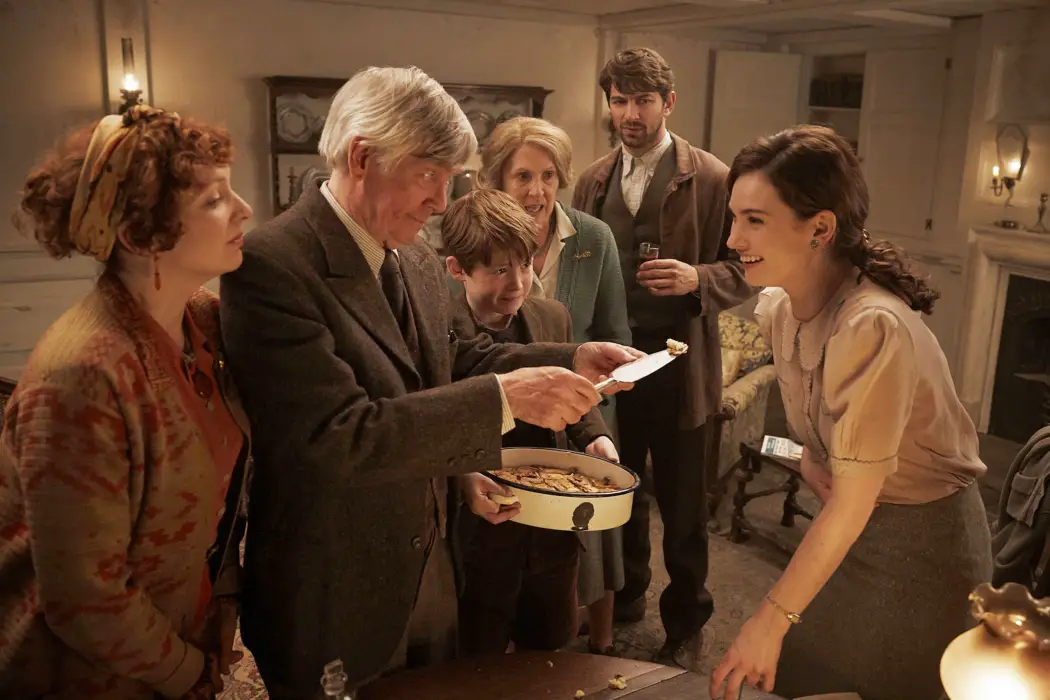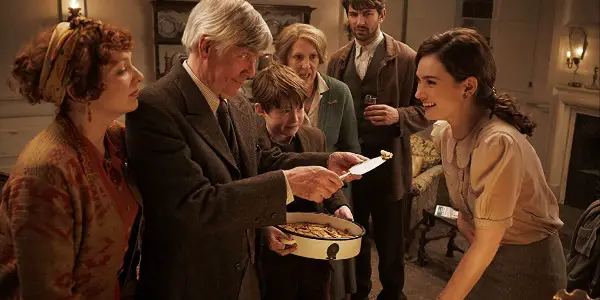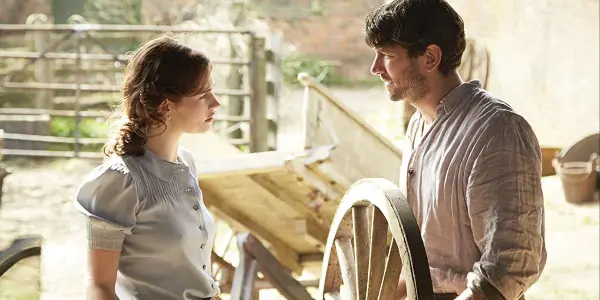Page to Screen: On THE GUERNSEY LITERARY & POTATO PEEL PIE SOCIETY and the Power of Sharing Stories

Josh is an Australian writer. He is an undergraduate at…
Page To Screen is a column examining literary adaptations in conversation with their source material. Call up your book club and set out some canapés, we’re talking reading.
Let’s start with that title.
A haphazard collection of syllables, borderline nonsensical in their arrangement, and absurd to behold. To say The Guernsey Literary and Potato Peel Pie Society aloud leaves you equal parts breathless and giddy (really, try it). The alliteration of “Potato Peel Pie”, the way it juxtaposes against “Literary”, and how the whole thing is held together, like rosary beads, by the question that is “Guernsey”. Because really, what is a Guernsey?
Easy to overlook, however, is the humble “and” (which the film, for reference, replaces with an ampersand). While the rest of the title promises the stories content — it’s about literary societies, and potato peel pies, and Guernsey — it is the “and” that promises theme. It’s grammatical function as a conjunction is symbolic, linking two disparate elements, making them a larger whole, and this embodies the theme of The Guernsey Literary and Potato Peel Pie Society. It is a story about stories, why we share and retell them, and (on a broader, somewhat meta-level) why we adapt them.
On Mary Ann Shaffer and Literary Societies
Mary Ann Shaffer knew The Guernsey Literary and Potato Peel Pie Society would be the only novel she wrote. Schaffer’s health declined as the novel neared completion, and during the final edits, which doubled as her final months, she asked her niece, Annie Barrows, to assist her work. Having a novel published was Shaffer’s lifelong dream, one that she would never see realised. She passed away on February 16, 2008; the novel hit shelves in 2009.
Since publication the novel has enjoyed a steady growth in popularity, going from a niche favourite among book clubs and reading circles to a widely read and well-regarded modern tome. Its shadow has grown primarily through word-of-mouth recommendation. Symmetry exists between The Guernsey Literary and Potato Peel Pie’s cultural arc and its narrative content. Shaffer was inspired to write by her book club, who she then wrote into the novel in the form of the titular Literary and Potato Peel Pie Society; their love of sharing stories inspiring a story that is shared by people who love stories.

Parallels between the novel and reality recur, both intentionally and unintentionally. Shaffer is represented in-text by Juliet Ashton, a humour writer, and novelist who, like Shaffer in reality, discovers Guernsey by chance, when a resident named Dawsey Adams writes her because he has come into possession of her book, Essays of Elia. Equally Shaffer is represented by Elizabeth McKenna, a resident of Guernsey who is physically absent (having been deported by the Germans, who occupied the island during the Second World War) but emotionally omniscient.
Elizabeth’s acts of rebellion and kindness, one of which led to the foundation of the Literary and Potato Peel Pie Society, spur the community to heal in her absence, a way of honouring her sacrifice. They also engender the admiration of many of the people who hear them, Juliet included. Much in the same way The Guernsey Literary and Potato Peel Pie Society continues to inspire well beyond Shaffer’s passing; its popularity honours her and honours the people she loved.
Telling and retelling stories is the primary theme of the novel; by sharing we care, we heal, we grow. The literary society embodies of this notion. And by sharing the novel, readers enact its most essential idea; the chain of connection linking from Shaffer’s book club, to Shaffer, through the character’s the populate her work, to readers, to the friends of readers, and their friends and onwards, fiction burgeoning into reality.
On Mike Newell and Guernsey
There’s a scene midway through Mike Newell’s The Guernsey Literary & Potato Peel Pie Society in which Juliet (Lily James), having arrived on Guernsey, and met the Literary and Potato Peel Pie Society, argues with their members about whether Charlotte or Anne Brontë was the more progressive sister. Juliet asserts that Anne was the more outspoken, Agnes Grey is more direct than Jane Eyre in how it addresses the position of women. Not so, reply Amelia Maugery (Penelope Wilton) and Isola Pribby (Katherine Parkinson), can she not see that regardless of what’s on the page, Jane Eyre was more influential by virtue of it being more widely read?
The purpose of this scene is not to elucidate an answer (that job is best left to literary scholarship) but rather to address an underacknowledged truth about how we discuss the kind of any culture. The objective truth and quality are always secondary to the emotional reaction of the person consuming it. The respective parties take their positions because the texts they defend are dear to them; certainly, there is merit behind their arguments, but the arguments are merely fronting for their emotions. Notable about the scene is that the debate, while impassioned and fervent is not angry; the character’s take pleasure in the sincerity, enjoying how much one another cares.

Underlying this scene is the notion, fundamental to any scenario in which culture, and passion for said culture, is shared: there is no right interpretation, only your interpretation. This notion applies equally to the process of adaptation; indeed, the inclusion of the aforementioned scene may have been included to fend-off criticism from novel devotees before they could voice it. The joy of adaption comes from how the story differs from medium to medium as much as it is done from elements that are recreated wholesale.
In a DVD special feature for Harry Potter and The Goblet of Fire Daniel Radcliffe described Mike Newell as “Very, very English”, adding, “He wears a waistcoat every day.” Mike Newell’s adaptation of The Guernsey Literary and Potato Peel Pie Society is as English as he is. While the story beats are the same, the scope of the community depicted in the film is noticeably larger. The novel focuses on the micro — limiting itself, by and large, to the interpersonal relationships of its characters — the film, meanwhile, is interested in the macro, interrogating English notions of strength and tenacity.
Newell’s reading is that the tenacity of the Literary and Potato Peel Pie Society is endemic of the whole of Guernsey, and Guernsey is a microcosm of the English people holistically. The shape of the narrative, restructured for the screen so Juliet travels to Guernsey earlier, and stays longer, place a premium on the bonds between characters. The most vulnerable moments are when characters are emotionally isolated; a scene where Isola and Juliet confess sexual secrets (Isola is a virgin, Juliet’s best friend is gay) is contrasted against a later scene when Juliet leaves Guernsey (“When you’re gone…” Isola begins before cutting herself off, incapable of finishing the sentence for tears).

The second world war is a constant presence, a spectre over the film in a way it isn’t in the novel. By elevating it Newell adapts the theme of community, reinterpreting it for a broader context, and the two interactions between Juliet and Isola are that interpretation played out in miniature. United they are able to overcome trauma, no matter how personal, but isolated they are debilitated. The act of sharing, then, is as much for us as it is for each other.
Conclusion: On Elizabeth McKenna, Ands, and Ampersands
By the end of the narrative, Juliet, who has grown close to the residents of Guernsey, decides to become a permeant resident, commit to giving back to the community that gave to her. Her first gift is a book, the biography of Elizabeth McKenna, which recounts the manifold tales she recounted to her by her friends, the members of the Literary and Potato Peel Pie Society. The hole Juliet fills in the community is the one left by Elizabeth, and by writing her biography Juliet promises not just to replace but to advocate, passing the story on for others to hear and to be inspired.
At the risk of finding synchronicity where none exists, the reverberations of the fictional, as with so much of this narrative, can be felt in reality. Parallels between Elizabeth and Juliet and Shaffer and Newell, while understated, are undeniably present. Elizabeth never lives to see Guernsey post-occupation; Shaffer will never know the success of her novel, that is loved, that it was adapted.
While Shaffer’s passing is tragic, the staying power of her book, and its continued presence in the cultural conversation, speak not just to her talent as a writer, but to the value of the ideas, she sought to extol. Because The Guernsey Literary and Potato Peel Pie Society is, after all, a story about the “and”.
What did you think of The Guernsey Literary & Potato Peel Society as a work of adaptation? Discuss in the comments?
Watch The Guernsey Literary and Potato Peel Pie Society
Does content like this matter to you?
Become a Member and support film journalism. Unlock access to all of Film Inquiry`s great articles. Join a community of like-minded readers who are passionate about cinema - get access to our private members Network, give back to independent filmmakers, and more.
Josh is an Australian writer. He is an undergraduate at the University of Wollongong, staff writer for Film Daze, and contributor for Film Inquiry. He once cried in Cats (2019), but that was an accident.













